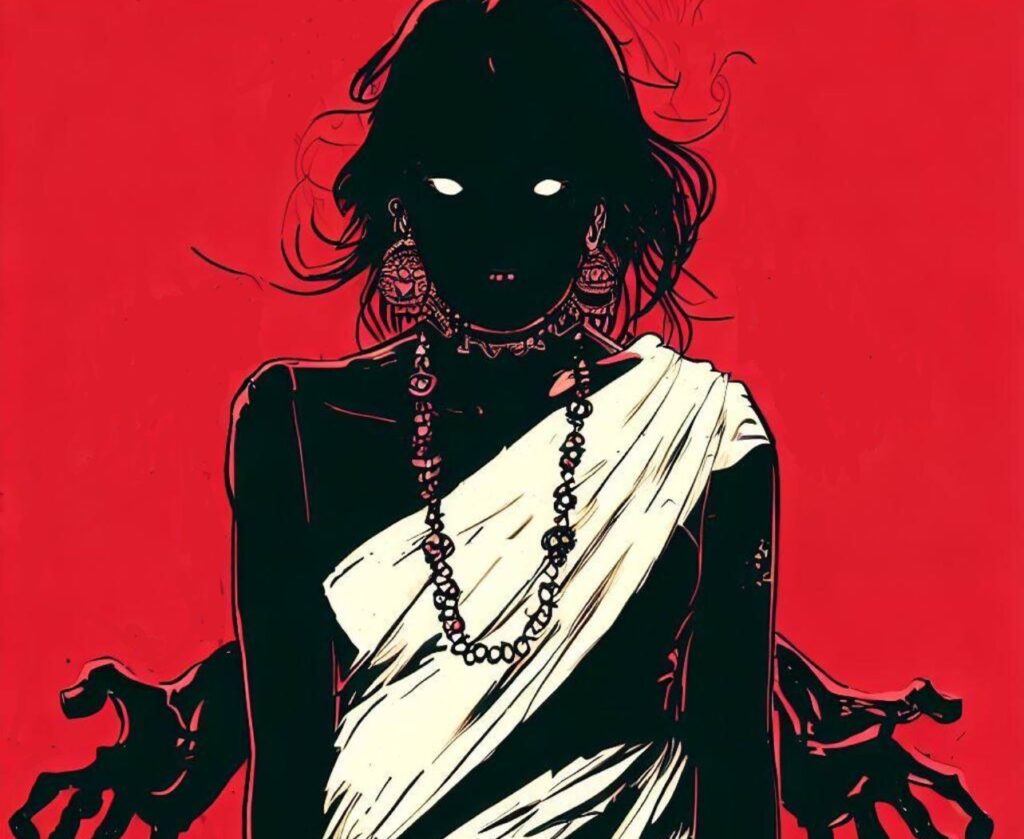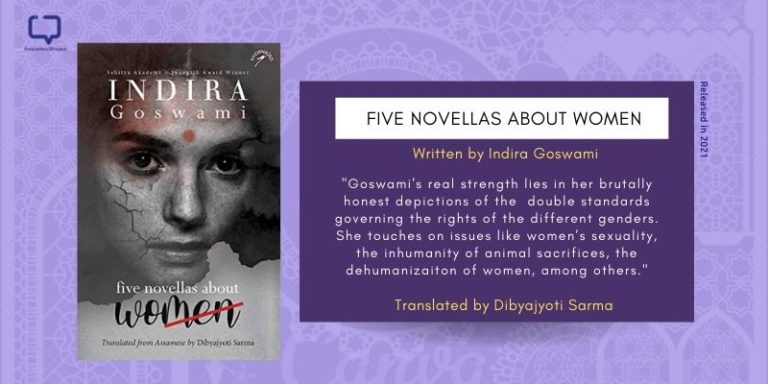Rahul Vishnoi reviews Shakchunni by Arnab Ray (published by Hachette India, 2024).
Shakchunni by Arnab Ray stands upon a skeleton of greed. The smell of want runs through the story, unifying most of the characters in different pursuits, all of who go down the road of avarice to achieve the deep, dark desires of their hearts.
Desires in the Dark: The Players of Shakchunni
Banerjees, the zamindars of Shyamlapur, are arrogant and cruel. Even though Shakchunni, an entity said to reside in the ruins of a temple near the Pagli river, haunts the village, it is the zamindars that wreak havoc upon the villagers, extracting interest upon the loan even during a long-drawn famine.
The Shakchunni, on the other hand, could be lulled into silence with an occasional sacrifice of an animal (some whisper that it’s a young human boy and not an animal.) The elder son, Narayanpratap, sent to London to study law so he could join the elitist politicians and bureaucrats working for the British government, comes back a jilted fool, having been snubbed by a Caucasian girl who didn’t want him. He quits his dream of becoming a barrister and returns to India, where he is married off to a poor Brahmin girl, Soudamini.
Recommended Reading: The Mine by Arnab Ray Review: A Slow Descent Into Madness
The younger son, Rudrapratap, forced to do the dirty work of selling off hoarded grain during the Great Bengal Famine, whiles away time in Calcutta. But this all changes when the family comes under the glare of Shakchunni.
Most of the suffering and the horror plays as the consequence of the bones of greed and want strewn throughout the story, seeded into the major as well as minor players. Narayanpratap hankers after a girl who dumped him so much that he ruins his marriage. His father, Raibahadur, covets his daughter-in-law, an ethereal beauty hiding behind her ghoomat. The younger son, Rudrapratap, wants nothing more than to go back to Calcutta to live a life of comfort. Handi, the maid, is vengeful and greedy for her childhood love. Most characters lust after money. Shakchuni, the entity herself, wants to possess a married woman.
Dancing With Darkness: The Mystery of Shakchunni

But what exactly is Shakchunni? She is said to be neither living nor dead, neither awake nor asleep. Seen only on the new moon’s night, she must be fed, or else she will choose her own food. She lusts for innocence but savours pain and fear. If you should meet her in the jungle on a new moon’s night, and she wants to dance with you first, you can trade a soul for a soul. But remember, she will consume you in the end, for her hunger is eternal.
Recommended Reading: Devotion of Suspect X: A Crime Fiction with a Strong Undercurrent of Love
Gore and Greed: Elements of Horror and Disgust
More than the Shakchunni herself, I consider the lusting father-in-law of the young bauma to be the chief horror officer of the story. Disgustingly perverted, he lusts after his daughter-in-law, warning her that his husband won’t be able to “plant his seed.” And even if he does, he claims, there is no chance it will be a boy because he “lacks the masculinity, the pourush, to beget boys.” He is a gone case, talking about seed and fornication and cock and whatnot at the drop of a hat. Although he appears in his horrifying avatar briefly, it is enough to scar the reader’s mind with his leering. His violent wife comes a close second.

Stephen King, in his semi-memoir, semi-horror-dissecting-non-fiction Danse Macabre, writes a horror novel, apart from the usual scary elements, must also have an “element of disgust,” something that, as the name suggests, can disgust the reader. It could be blood and gore, debauchery of inhuman extent, cruelty to animals, graphic descriptions of triggering violence or some such element that is enough to make the reader squirm without making them averse to reading further.
Both these elements should exist in harmony. In Shakchunni, the aspect of disgust is the zamindars, their cruelty to their subjects and the scenes depicting hungry people searching for scraps in the drains as the great Bengal famine rages on. When Rudrapratap is on his way to sell hoarded grains, he comes across a family exhausted from months of hunger.
… (they were) all bones and tattered clothes, groaning so softly that no sound came from their throats. The man was keeled over to the side and a pack of stray dogs, at a distance, was circling around… They had smelt death. The woman threw a small stone, and it clattered to the side, but the dogs did not even flinch. They knew, as did Rudrapratap, that they only needed to play out time. He looked at the family yet again. The woman was now reaching down into the drain for what must be a scrap of something that was once food.
– Arnab Ray, Shakchunni
Another scene that discusses the reluctance of meat eater to pick up the cleaver and kill their own food stands out. A character shares that he is comfortable eating a mean mutton curry. However, he would hesitate to kill a lamb.
Honour and Humiliation: Soudamini’s Struggles in Shakchunni
The story takes a turn when Soudamini, exhausted by relentless torture at the hands of her mother-in-law, bouthakarun, takes a drastic step to attract the eye of her husband. She had been beaten and mocked, called “her ladyship of flowers” since the jewellery she wore at her wedding was organic, and couldn’t eat unless every servant had finished their meals.
Her husband, apathetic towards her, explains in a rare moment of clarity that she is made to work like a maid because this place knows that her husband has no power, no money and no say in the family. That’s why the house dishonours him and, by extension, her. In a rare display of passion towards his wife, he says:
Every blow dealt to you is a blow dealt to me. Every angry word they utter at you is an assault on my honour. My mother cannot hurt me as I am her son, but nothing holds her anger back when it comes to you. You are not the one she wanted, just as I am not the son she desired.
– Arnab Ray, Shakchunni
Recommended Reading: 12 Must-Read Indian Translated Mystery Books
This scene is one of the most accurate depictions of how joint Indian families worked (and work), how they treat their daughters-in-law differently based upon how well their husbands earn. I have not found a description that resonates with the one written by Ray in any other book, and this insight is admirable (I suspect I might find it if I reread Premchand).
The seamless way the reason behind Soudamini’s plight is woven into the story speaks for Ray’s writing skills. The scenes where Raibahadur solicits his daughter-in-law and the one where Bouthakarun has a showdown with Soudamini when she comes to know she isn’t working in the kitchen anymore are positively electrifying.
A Mixed Bag: The Strengths and Flaws of Arnab Ray’s Shakchunni
One of my favourite scenes is when Rudrapratap throws caution to the wind and ventures into the forest at dusk and ends up being marked by Shakchunni. The writer’s explanation of how science has been unable to explain the supernatural is quite interesting. Kalikinkar, the accountant, tells him that science is all calculation and arithmetic.
While it can explain where a tree falls once it is struck by lightning or what causes lightning, it can never explain why that tree, among all the others, was chosen and why it fell burning. Someone might say that it is like throwing a dice, but that is not how the world works. Things do not happen just like that. Some people get the dice thrown their way all the time, and some do not and have the misfortune to follow them wherever they go.
Recommended Reading: Black River : A Deadly Combination of Murder and Mayhem
What I didn’t like was the excessive use of profanities and continuous explanations of Hindi and Bengali words in the text. In some places, the dialogues go unnecessarily wrong. The backstory of the firstborn son could be edited out as that would have added an aura of mystery to Narayanpratap’s character. And I am always squeamish when the writer introduces a scene of violence against animals. Ray godfather-s an Arabian horse but I wished the description was not so graphic.
Favourite Quote from Shakchunni by Arnab Ray
The further I am from sin, the more I can fool my conscience that the sin is not mine. I tell myself it’s someone else sharpening the knife, someone else watching the blood roll, someone else cleaning bone and sinew, and I know it’s a lie.
Conclusion
The climax of the book may come as a shocker to you or a click that sets everything in place, depending on how you like your horror. Caution must stay in the wind!
Have you read this tale of greed, horror, and the supernatural? We want to know your thoughts! Comment below and let us know!





















